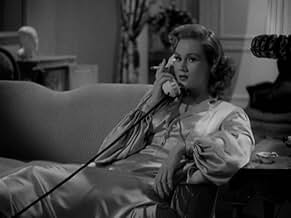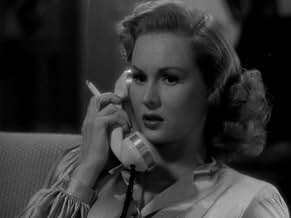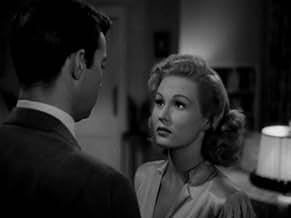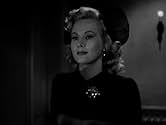NOTE IMDb
6,5/10
1,1 k
MA NOTE
Ajouter une intrigue dans votre langueMob attorney Walter Colby is manipulated by showgirl Flaxy Martin into taking the rap for a murder committed by mobster Hap Richie's goons, but he escapes and tries to get revenge.Mob attorney Walter Colby is manipulated by showgirl Flaxy Martin into taking the rap for a murder committed by mobster Hap Richie's goons, but he escapes and tries to get revenge.Mob attorney Walter Colby is manipulated by showgirl Flaxy Martin into taking the rap for a murder committed by mobster Hap Richie's goons, but he escapes and tries to get revenge.
- Réalisation
- Scénario
- Casting principal
Leah Baird
- Tenement Resident
- (non crédité)
Marjorie Bennett
- Nora's Neighbor
- (non crédité)
Paul Bryar
- Policeman with Witness
- (non crédité)
Jack Cheatham
- Police Dispatcher
- (non crédité)
Edgar Dearing
- State Trooper
- (non crédité)
John Elliott
- Judge Edward R. McVey
- (non crédité)
Creighton Hale
- George
- (non crédité)
John Harmon
- Fred Banford
- (non crédité)
Eddie Hart
- Detective with Nora
- (non crédité)
Avis à la une
Virginia Mayo is a man trap in "Flaxy Martin," a 1949 noir starring Zachary Scott, Dorothy Malone, Helen Westcott, and Tom D'Andrea.
Scott plays a mob lawyer Walter Colby, who's sick of the cases handed him by mobster Hap Ritchie (Douglas Kennedy). He's in love with Flaxy (Mayo), who is two-timing him with Hap, though Walter doesn't know that.
Flaxy talks him into staying until they have enough money to take off. When Walter finds out a witness (Westcott) was paid off to give an alibi to one of Hap's henchmen in a murder case, he threatens to go to the D. A. about it.
Before he knows it, with Flaxy's help, he's been framed for the witness' murder. He escapes from custody and, going on the run, meets Nora (Malone).
Compelling film with excellent performances by Mayo, Westcott, Malone, and Elijah Cook, Jr., as one of Hap's ruthless thugs.
Mayo is as cold as they come, sexy and convincing as she manipulates her men. It's always fun to see Tom D'Andrea, whom baby boomers remember as Gillis in "The Life of Riley" as well. He has a small role, but he's very good.
Zachary Scott is Zachary Scott - he has a strong film persona, a good speaking voice, and does tough well. He's not that slimeball Monty from "Mildred Pierce," though, just someone who works for a low-life.
Well worth seeing.
Scott plays a mob lawyer Walter Colby, who's sick of the cases handed him by mobster Hap Ritchie (Douglas Kennedy). He's in love with Flaxy (Mayo), who is two-timing him with Hap, though Walter doesn't know that.
Flaxy talks him into staying until they have enough money to take off. When Walter finds out a witness (Westcott) was paid off to give an alibi to one of Hap's henchmen in a murder case, he threatens to go to the D. A. about it.
Before he knows it, with Flaxy's help, he's been framed for the witness' murder. He escapes from custody and, going on the run, meets Nora (Malone).
Compelling film with excellent performances by Mayo, Westcott, Malone, and Elijah Cook, Jr., as one of Hap's ruthless thugs.
Mayo is as cold as they come, sexy and convincing as she manipulates her men. It's always fun to see Tom D'Andrea, whom baby boomers remember as Gillis in "The Life of Riley" as well. He has a small role, but he's very good.
Zachary Scott is Zachary Scott - he has a strong film persona, a good speaking voice, and does tough well. He's not that slimeball Monty from "Mildred Pierce," though, just someone who works for a low-life.
Well worth seeing.
A really good cast puts over a noir feature from Warner Brothers that's undone by an incredibly, unbelievable plot component. As another Warner Brothers star used to say, "what a maroon".
Zachary Scott plays a criminal attorney who gets off mob hit man Elisha Cook, Jr. on some perjured testimony by Helen Westcott. When Scott finds out about the perjury he fears bar association sanctions and determines to break with mob boss Douglas Kennedy. But Kennedy has other plans that involve Scott's girl friend Virginia Mayo who is in the title role of Flaxy Martin.
Mayo's trading up and she goes to Scott with a tearful story about how she's suspected in the murder of Westcott. So what does this brilliant lawyer do who is now thinking with his male member? He offers to confess and says he's so good at his job that he can win acquittal at trial. But not against some perjured eye witness testimony that Kennedy gets to help the prosecution along.
Of course Scott escapes and starts looking for more than vindication. In that he's aided by friend Tom D'Andrea and farm girl Dorothy Malone who feels sorry for him.
After that horrible premise, the film does pick up and ends rather well. If you've seen Virginia Mayo in White Heat you know how it ended for her there. Ends even worse for her here, but similarly. In fact I'm sure Mayo was cast in Flaxy Martin on the strength of White Heat.
As for Zachary Scott the part he has is one I think might have been written with Humphrey Bogart in mind, but Bogey left Warner Brothers the year before.
Though it's rather unbelievable Flaxy Martin is good display of the talents of both Virginia Mayo and Zachary Scott.
Zachary Scott plays a criminal attorney who gets off mob hit man Elisha Cook, Jr. on some perjured testimony by Helen Westcott. When Scott finds out about the perjury he fears bar association sanctions and determines to break with mob boss Douglas Kennedy. But Kennedy has other plans that involve Scott's girl friend Virginia Mayo who is in the title role of Flaxy Martin.
Mayo's trading up and she goes to Scott with a tearful story about how she's suspected in the murder of Westcott. So what does this brilliant lawyer do who is now thinking with his male member? He offers to confess and says he's so good at his job that he can win acquittal at trial. But not against some perjured eye witness testimony that Kennedy gets to help the prosecution along.
Of course Scott escapes and starts looking for more than vindication. In that he's aided by friend Tom D'Andrea and farm girl Dorothy Malone who feels sorry for him.
After that horrible premise, the film does pick up and ends rather well. If you've seen Virginia Mayo in White Heat you know how it ended for her there. Ends even worse for her here, but similarly. In fact I'm sure Mayo was cast in Flaxy Martin on the strength of White Heat.
As for Zachary Scott the part he has is one I think might have been written with Humphrey Bogart in mind, but Bogey left Warner Brothers the year before.
Though it's rather unbelievable Flaxy Martin is good display of the talents of both Virginia Mayo and Zachary Scott.
Catch that great scene where Flaxy (Mayo) beats up a blackmailing Peggy, (Westcott) with the timid hotel clerk hovering outside the door. Big-eyed Westcott really delivers in spades. Too bad the rest of the movie fails to reach that intense level. Looks to me like Warner Bros. used the film as an A-team try-out for cast principals and director. Now, Scott, for one, comes through perfectly as the lawyer with a wobbly compass— I'm just sorry this fine, exotic actor never got the recognition his talent deserved. The material, however, with its nifty double- cross, really merited an A-team director, like Walsh or Curtiz. Instead, the studio gave featurette director Richard Bare a shot, and the result shows he had little feel for the dark material.
Unfortunately, the movie is inferior grade noir, lacking in both style and edge. Take the early scene where Walt (Scott) and Hap (Kennedy) iron out wrinkles in the plot to free Caesar (Overman) from a murder rap. They're standing stock still in Hap's living room, talking, and that's the trouble: they stand stock still for about two minutes doing little more than delivering their lines. Thus, a potentially dramatic scene of rivalry calling for an expressive dynamic falls flat, drained of needed energy and tension.
But Bare seems most at sea in directing the lead actresses. Mayo looks lost in her key scenes with Scott— the second side of Flaxy's devious personality, the calculating side, fails to appear, and thus we're left with a very pretty girl speaking the lines, but without the necessary depth. Catch Malone too in the graveside scene. She's an unsophisticated librarian staring into the open pit of her own doom, but judging from the absence of needed emotion, she might as well be reading a book. Now, Malone later proved a fine actress of many dimensions, (e.g. Written on the Wind {1955}). Here, however, she's stuck in a thankless good girl role, so likely director Bare is at fault for not giving her the necessary cues. I suspect the movie would have improved had actresses Malone and Mayo switched roles.
Then too, Walt's sudden turn-around with 40 grand in his pocket is awkwardly handled. Even an A-grade filmmaker would have trouble making this bit of Production Code hokum believable, but in Bare's hands it comes across as little more than a clumsily developed happy ending. Thus, it's not surprising that the studio returned the director to making the humorous shorts he was so good at following this failed experiment. I also better understand why editors Silver and Ward omitted this entry from their highly successful tome Film Noir. Unfortunately, the movie may have all the trappings of the genre, but like bread dough in the hands of a neophyte baker, the loaf simply fails to gel.
Unfortunately, the movie is inferior grade noir, lacking in both style and edge. Take the early scene where Walt (Scott) and Hap (Kennedy) iron out wrinkles in the plot to free Caesar (Overman) from a murder rap. They're standing stock still in Hap's living room, talking, and that's the trouble: they stand stock still for about two minutes doing little more than delivering their lines. Thus, a potentially dramatic scene of rivalry calling for an expressive dynamic falls flat, drained of needed energy and tension.
But Bare seems most at sea in directing the lead actresses. Mayo looks lost in her key scenes with Scott— the second side of Flaxy's devious personality, the calculating side, fails to appear, and thus we're left with a very pretty girl speaking the lines, but without the necessary depth. Catch Malone too in the graveside scene. She's an unsophisticated librarian staring into the open pit of her own doom, but judging from the absence of needed emotion, she might as well be reading a book. Now, Malone later proved a fine actress of many dimensions, (e.g. Written on the Wind {1955}). Here, however, she's stuck in a thankless good girl role, so likely director Bare is at fault for not giving her the necessary cues. I suspect the movie would have improved had actresses Malone and Mayo switched roles.
Then too, Walt's sudden turn-around with 40 grand in his pocket is awkwardly handled. Even an A-grade filmmaker would have trouble making this bit of Production Code hokum believable, but in Bare's hands it comes across as little more than a clumsily developed happy ending. Thus, it's not surprising that the studio returned the director to making the humorous shorts he was so good at following this failed experiment. I also better understand why editors Silver and Ward omitted this entry from their highly successful tome Film Noir. Unfortunately, the movie may have all the trappings of the genre, but like bread dough in the hands of a neophyte baker, the loaf simply fails to gel.
If you can get past the overly contrived plot, this is an enjoyable minor Film Noir. While it's far from the best example of Noir, FLAXY MARTIN can boast one of the most evil femme fatales you'll ever find. In the title role, Virginia Mayo digs her teeth into a selfish, scheming, two-timing dame that rivals just about any of the better-known ones. Flaxy is a nightclub singer (we never see her perform, not even dubbed) kept by syndicate boss Hap Richie (Douglas Kennedy). Unknown to Hap, she's also keeping company with syndicate lawyer Walt Colby (Zachary Scott) who is unaware of her liaison with Hap. Things get interesting when Hap forces Walt to get one of his thugs, Cesar, out of jail after a killing he's committed. He complies, but Walt is tired of his criminal associations and wants to settle down with Flaxy, who pretends to go along with him for a while. Then a paid 'witness" Peggy Farrar (Helen Westcott) is found murdered and it looks like Flaxy is the guilty party. Strongly smitten Walt offers to plead guilty in place of Flaxy, certain he can be acquitted, but Flaxy and Hap take advantage and Walt is on his way to prison. He manages to escape (in a wild sequence) and ends up meeting Nora Carson (Dorothy Malone) a trusting soul who's immediately taken with him. Though he gives her a rough time from the start, Nora helps Walt evade police and relentless pursuit of Roper (Elisha Cook, Jr.) . More help comes from Sam Malko (Tom D'Andrea) an old associate who owes Walt a favor. The plot is full of coincidence and easy solutions, but there is plenty of action, not least of which is a night-time chase that ends with Walt and Roper battling on a rooftop. Everyone in the cast is good, with Mayo, Scott, Westcott (excellent in her brief role) standing out. The ever-dependable Cook is really terrific as small-time hood treated like an idiot by both Hap and Walt ("Go back to sixth grade!") and who wants his revenge. See it for the cast and the crazy plot.
This film starts with overconfident Scott foolishly taking the fall for Virginia Mayo. He ends up in prison and subsequently escapes. He ends up on the run and virtual stranger Dorothy Malone decides to upend her life and follow him.
Strange plot, strange character motivations make this unbelievable, yet it is still entertaining as a B noir.
Strange plot, strange character motivations make this unbelievable, yet it is still entertaining as a B noir.
Le saviez-vous
- AnecdotesComposer William Lava repeatedly uses a five-note melody cribbed or "sampled" directly from Alfred Newman's composition for the theme from King Vidor's romantic drama Scène de la rue (1931). This Newman theme was recycled for the theme for Qui a tué Vicky Lynn? (1941) and it soon became a staple of the studio's noir dramas, used as an trope of of the Big City in films like L'impasse tragique (1946), Le Carrefour de la mort (1947) and La Proie (1948).
- GaffesRoper and Caesar continually address Colby (a lawyer) as "Shamus". A shamus is a private eye; the word they likely meant to use is "shyster".
- Citations
Hap Richie: She's a great kid. You can always trust her to double-cross you.
- ConnexionsReferenced in Les enquêtes de Remington Steele: Cast in Steele (1984)
- Bandes originalesSouth American Way
(uncredited)
Music by Jimmy McHugh
[Played on the piano when Flaxy and Walt arrive at Hap's party]
Meilleurs choix
Connectez-vous pour évaluer et suivre la liste de favoris afin de recevoir des recommandations personnalisées
- How long is Flaxy Martin?Alimenté par Alexa
Détails
- Date de sortie
- Pays d’origine
- Sites officiels
- Langue
- Aussi connu sous le nom de
- L'amante del gangster
- Lieux de tournage
- Société de production
- Voir plus de crédits d'entreprise sur IMDbPro
- Durée1 heure 26 minutes
- Couleur
- Rapport de forme
- 1.37 : 1
Contribuer à cette page
Suggérer une modification ou ajouter du contenu manquant

Lacune principale
By what name was La sirène des bas-Fonds (1949) officially released in India in English?
Répondre




































